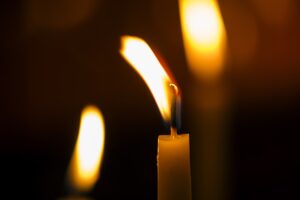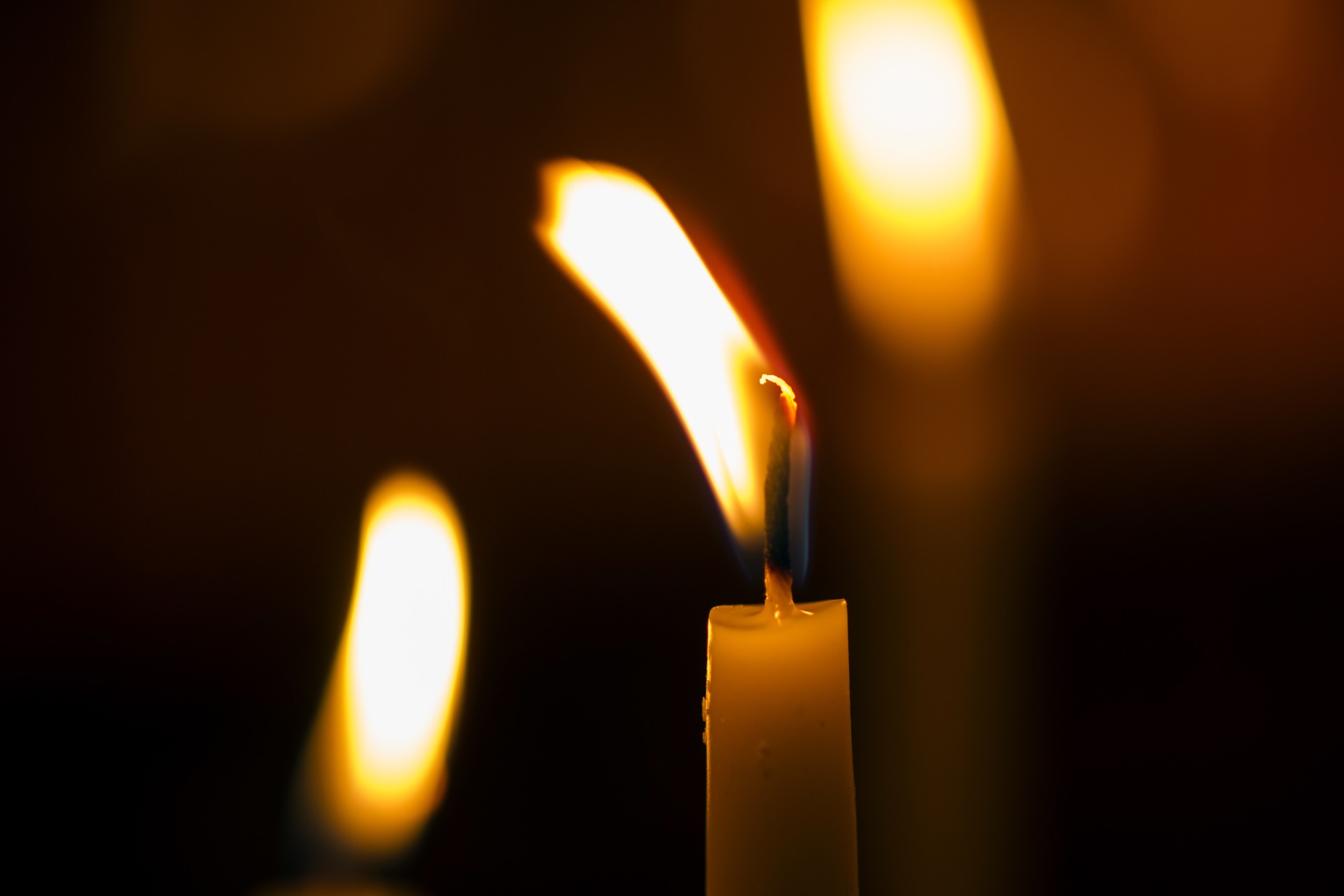People think in metaphors. Jonathan Haidt accurately observes that with the wrong metaphor we are deluded and with no metaphor we are blind.
 This week we will discuss two metaphors for how we can organize our lives. It is possible to never give much thought to how we organize our lives, we just live life as it comes and make it up as we go. When we don’t think about how our lives are organized we are like a candle in the wind, metaphor number one (Yes, we will listen to Elton John’s song at the beginning of our conversation on Wednesday and think briefly how Norma Jean Baker lived her life like a candle in the wind). A candle in the wind is vulnerable, weak, and likely to fail.
This week we will discuss two metaphors for how we can organize our lives. It is possible to never give much thought to how we organize our lives, we just live life as it comes and make it up as we go. When we don’t think about how our lives are organized we are like a candle in the wind, metaphor number one (Yes, we will listen to Elton John’s song at the beginning of our conversation on Wednesday and think briefly how Norma Jean Baker lived her life like a candle in the wind). A candle in the wind is vulnerable, weak, and likely to fail.
Our second metaphor will be The Rock of Gibraltar. A famous geological formation dating back to early part of the Jurassic Period some 175-200 million years ago. This rock has been there a long time and it isn’t going anywhere soon. This metaphor symbolizes a life which is organized around truth, principles, and rules that do not change.
 It seems to me that many (most) young people are living like a candle in the wind. Although for young people who are committed to this lifestyle it might surprise them to know this is rather new way of thinking. The idea that life can’t be organized around truth was first articulated Fredrich Nietzsche, a German Philosopher (1844-1900) who suggested that God was dead (because He {God} never existed, He was just made up so people didn’t feel so alone in the universe) and later by French philosopher Albert Camus (1913-1960) who wrote, “Life is meaningless. Thus, man’s existence is absurd because his contingency finds no external justification”. These philosophers did not have much impact on the popular culture at the time of their writing. In the 19th century and for the most of the 20th century popular opinion was there is a God and your life should be organized around who He is and what He demands. Of course, there was little agreement on what God was like or what He demanded of His creation, but His existence wasn’t questioned by the masses.
It seems to me that many (most) young people are living like a candle in the wind. Although for young people who are committed to this lifestyle it might surprise them to know this is rather new way of thinking. The idea that life can’t be organized around truth was first articulated Fredrich Nietzsche, a German Philosopher (1844-1900) who suggested that God was dead (because He {God} never existed, He was just made up so people didn’t feel so alone in the universe) and later by French philosopher Albert Camus (1913-1960) who wrote, “Life is meaningless. Thus, man’s existence is absurd because his contingency finds no external justification”. These philosophers did not have much impact on the popular culture at the time of their writing. In the 19th century and for the most of the 20th century popular opinion was there is a God and your life should be organized around who He is and what He demands. Of course, there was little agreement on what God was like or what He demanded of His creation, but His existence wasn’t questioned by the masses.
In the last 70 years the idea that there is no God (or rock on which to organize your life) has taken root in popular culture. In the 1960s and 70s there was a lot of optimism that without a rock (no God, no rules, no coherent philosophical truth) there would be a freedom which would have a very positive impact on society (Bertrand Russell’s, The Conquest of Happiness and John Lennon’s Imagine). However, without truth to anchor our lives to we look more like a candle in the wind.
Émile Durkheim (1879-1882) collected data from across Europe to study the factors that affect the suicide rate. “No matter how he parsed the data, people who had few social constraints, bonds, and obligations were more likely to kill themselves…Durkheim concluded that people need obligations. and constraints to provide structure and meaning to their lives.” A hundred years and thousands of scientific studies have firmly established his findings. If you want to predict how happy someone is, or how happy they will be in the future, measure their social obligations. People who are anchored to truth, and have rules to live by, will be happier than people who are free from God, rules and social responsibility. The research shows that people will be happier if they have a rock to anchor their lives to.
I think that we do American high school students a great disservice when nowhere in the American high school curriculum is there a discussion about possible ways to organize your life around a rock. Although it is unstated, it is assumed that there is no viable rock. The America educational system has silently adopted Nietzsche’s nihilism. If I could write the curriculum, I would suggest at least three possible “rocks” to anchor and organize life.
I would start with Stoicism. Stoicism is “an ancient Greek school of philosophy founded at Athens by Zeno of Citium. The school taught that virtue, the highest good, is based on knowledge; the wise live in harmony with the divine Reason (also identified with Fate and Providence) that governs nature and are indifferent to the vicissitudes of fortune and to pleasure and pain”. This captures the Buddhist idea that if we are to live well, we must insulate ourselves from the pleasure and pain that comes with living.
 Next I would spend a good deal of time discussing hedonism. I think that, without examining the idea, many young people have adopted Hugh Hefner’s philosophy that life is about pleasure (especially sexual pleasure), entertainment, and enjoyment of luxury items. Although many young people have adopted this philosophy, I don’t think they have closely examined the rules or the implications. It seems to me that Hugh Hefner had thought a great deal about this kind of a philosophy and was committed to it. From what I know Hefner was NOT a candle in the wind, he was anchored to the rock of hedonism.
Next I would spend a good deal of time discussing hedonism. I think that, without examining the idea, many young people have adopted Hugh Hefner’s philosophy that life is about pleasure (especially sexual pleasure), entertainment, and enjoyment of luxury items. Although many young people have adopted this philosophy, I don’t think they have closely examined the rules or the implications. It seems to me that Hugh Hefner had thought a great deal about this kind of a philosophy and was committed to it. From what I know Hefner was NOT a candle in the wind, he was anchored to the rock of hedonism.
Finally, I would suggest that religion offers a viable rock which has been used throughout most of human history and in almost every society to bring order to the lives of the people within the society. Religion isn’t easy to define, simplify, or reduce. But it seems that most religions believe in a creator who has designed our universe and created rules by which people should organize their lives. Unlike Stoicism or Hedonism religion acknowledges a transcendent reality which cannot be measured or understood through reason or the scientific method.
In Jonathan Haidt’s Happiness Hypothesis he devotes a chapter to the importance of transcendence in our lives if we want to be happy. (I am using transcendence here to mean the feeling that we belong to something bigger than ourselves and we serve a higher order that is bigger than we are.) He writes, “sacredness (transcendence) is so irrepressible that it intrudes repeatedly into the modern profane world in the form of ‘crypto-religious’ behavior”. The chapter is entitled “Divinity With or Without God”. From the chapter it seems clear that if we want to find happiness, we must experience transcendence. That is, we must feel like we belong to and serve something bigger than just ourselves.
 I know that there is little agreement on religion, and I WILL NOT fight or ever try to prove that I am right. However, I think orthodox Christianity makes the most sense. I find the historical evidence surrounding the resurrection of Jesus to be compelling. After a lifetime of study there is much of the Bible I don’t understand. However, I find that it is a reliable guide for how I want to live and by studying the Bible with others I gain insight and make really good friends.
I know that there is little agreement on religion, and I WILL NOT fight or ever try to prove that I am right. However, I think orthodox Christianity makes the most sense. I find the historical evidence surrounding the resurrection of Jesus to be compelling. After a lifetime of study there is much of the Bible I don’t understand. However, I find that it is a reliable guide for how I want to live and by studying the Bible with others I gain insight and make really good friends.
When I was 15, I decided to organize my life around Jesus Christ, orthodox Christianity, and the Bible. I have NEVER regretted that decision. I have not always done well at living the Christian life and I am embarrassed how often I have and continue to fail. But I feel like I have always had a rock to anchor my life.
I have really liked thinking about happiness over the last several months that I have been leading these conversations and I have learned a lot. But there are a couple of things which I think about often and am not sure where they fit in, so I am going to just cram them in at the end of this blog.
First, I think that pursing happiness does not lead to happiness. Happiness comes when we think about and make good decisions every day, when we pursue the truth, when think of others and pursue a higher purpose. In our conversations each week my goal is to encourage others not to pursue happiness but to think deeply about the small decisions we make every day, truth, the good of others, and serving a higher purpose than just our happiness.
The second thought I have had surrounds the word happiness. I like that word a lot and I think it is the right word to advertise our Wednesday conversations. But I am using the word to denote something much deeper than the momentary pleasure that we feel when we eat ice cream, have sex, or see a funny video. I am using happiness to denote the deep feeling that life is good and I am glad I am part of it. I want others to experience the deep joy that comes with living even when life is really hard and confusing. My life has not always been easy. There have been seasons of deep discouragement, fear, and anger. But even in those dark seasons there was a feeling that life is good, it is going to get better, and I am glad I am on this adventure of life. That is the happiness that I wish for others. The goal of our Wednesday conversations is to move us all to that deep joy that come when we are anchored to a rock!
Thanks for reading.

Brad, are their principles from stoicism that you have adopted as a Christ-follower?